#Jenova's Witness
Explore tagged Tumblr posts
Text
.....is it possible to be a nun for a fictional character?
CAN YOU BE A NUN FOR A FICTIONAL CHARACTER?
Can Jenova have nuns?
I gotta know.
22 notes
·
View notes
Text
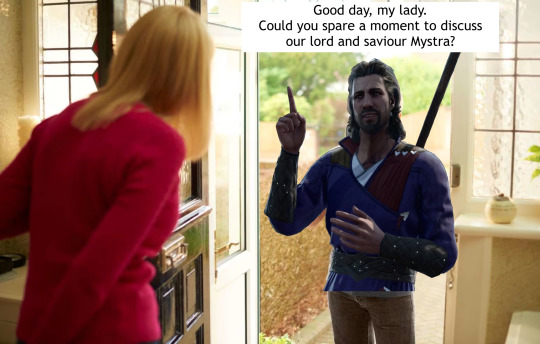
And before you ask, the answer is no, I will not stop posting badly cropped photos of Gale into pictures for memes.
#gale#bg3 gale#bg3#baldur's gate 3#bg3 memes#bg3 meme#baldur's gate#baldur's gate iii#baldurs gate 3#baldurs gate#baldurs gate iii#meme#gale bg3#jehovas witnesses#door to door#jenovas witnesses#dear god save me
81 notes
·
View notes
Text

Name: Zerin Maeda Alias: Mother of Monsters Division: 12 (shares a 5th seat with Yuuji Saito)
Zanpakuto: Kami o shiranai shisai [Godless Priest] Shikai: Officiate and join hands (Release) - Vanishing from the tip of the blade to the pommel- Zerin's Zanpakuto turns to 'ash' so to speak (moreso an airborne virus) allowing her to create mindless soldiers to whoever breathes in the air around them. - the 'ash' is, in reality, her blade, which can return to normal size at any given moment once oxygen enters the lungs and the body (brain, veins, organs, etc.) once she feels she is done with them.
Bankai: Kami o Shiranai Shisai: Kami no norowareta-tai [Godless Priest: God's cursed body] - Zerin's bankai dissolves her Zanpakuto into a virus that forms on herself and her enemies in the form of blackened skin. A sickness of sorts, starting out with flashes of their fears and the voices of the people they love used against them. As time goes on, the virus will spread from the spot it began, leaking black ichor and weakening both herself and her enemies. Sometimes the ichor does end up leaking from the eyes, mouth, and nose- if it reaches your face you've already lost. - Her Bankai stops only when one of the runs out of Reiatsu or the means to fight off the virus. She does have a vial of antidotes and medicine to heal herself once the fight is over but she doesn't utilize them unless necessary.
#A virus for one and a virus for two#* {Zerin Maeda; OC}#* {Headcanons}#I said she's based heavily around Jenova (FF7) so to add context- her shikai is based around the Jenova's witnesses from the OG and remakes#Her Bankai? Geostigma from Advent children.#Plagues could also be applicable tbh but fam I love my fucked up wife sm#I was not happy with what I had before! :)#but I feel like I am now...key word: feel like
7 notes
·
View notes
Text
Playing og FF7 alongside a friend is so fun until your glee/'yep I've been there' reaction to your friend seeing Aerith's death for the first time is immediately punished by the combined psychic damage of having to watch that whole cutscene four times because you lost to Jenova three times.
#i kid its been so fun witnessing a newer fan's reactions to things in og 7#but goddamn Jenova kicked my ass.#I'm not spoiler tagging this the og came out in 1997#ff7#og ff7#final fantasy 7
2 notes
·
View notes
Text
enjoying ff7 so far. everytime sephiroth shows up my brain immediately thinks of donald duck going "sora it's sephiroth!"
4 notes
·
View notes
Text
My sincerest apologies and warmest welcome to my rant about FF7: Crisis Core. Or, as I like to call it,
Propaganda: The Video Game
I say this with the utmost affection. Crisis Core ranks really high up there in my favorite Final Fantasy 7 installments. I played it when it first came out, borrowing it from a friend to play on a borrowed PSP. And, the more I learn about the game and the more I replay it, the more everything lines up.
This game is not about Zack Fair.
This game is about how Capitalistic Propaganda can sink into every aspect of life to the point where it is entirely indistinguishable from reality. And it’s very overt about it. So…
Here we go.
My treatise on Propaganda’s starring role in Crisis Core.
Part One: The Timeline
Something that a lot of people gloss over due to decades of Child Heroes in media—Japanese Shonen and Shoujo series in particular—is how young these protagonists are. We’ll hand-wave a lot of stuff in non-live-action series with just a little bit of suspension of disbelief. And that’s honestly just accepted these days. But here’s the thing about those hand-waves.
Final Fantasy 7 doesn’t do that.
Now, FF7 hand-waves a lot of stuff. For example, how far you can travel in a day by foot, the distance a man weighing approximately 165lbs can jump after being genetically fused with what might as well be a cocaine demon (Jenova), and how much hairspray one can reasonably carry on a cross-country journey while on the run from the feds.
Age is not one of them.
Exhibit A: Yuffie Kisaragi.
Do I really need to say more? She acts her age. So does Zack. And Aerith, even. Most of the characters in the original lineup were over twenty for a good reason. We see several kids in the series, and they all act their age, too—both the OG and the remake. Age is not a thing that FF7 really grapples with. It’s something they take relatively seriously.
Now, to the point.
Zack is 16 when Crisis Core starts…
… and he was 13 when he ran away from home without his parents’ knowledge to join the military.
Which accepted him.
At 13.
Without a parental permission slip.
Think about that for a second.
… Or for the next several parts of this breakdown.
Part Two: The Main Character
As I mentioned in the introduction, Zack is not the main character of the events of Crisis Core. Instead, he is the focal point of the second person POV. This is not the first time Square has done this. It was done most notably with FF9, FF10, and FF12. (I’m not going to go on an Akira Kurosawa rant right now, but please check out his film “The Hidden Fortress”. FF12 and Star Wars episodes 4-6 borrow heavily from this film.) The purpose and position of this character is such that they might best witness the effects the other characters make on the world as their stories unfold, usually in the role of a love interest. For Akira Kurosawa, it may have been told this way because these people are most effected by the decisions being made.
“Well, then, Sal,” you may be asking, “who would you say is the main character? Would that be Aerith, since she’s the love interest, like in the other games?”
No, actually.
It’s the antagonist.
And by that, I mean Genesis.
Hear me out. I used to hate Genesis, for I was once young, full of judgement for flamboyancy (thanks, internalized homophobia), and was led by the narrative to believe he was mean to his friends. Then I met my Lovely beta who loved him, so I wrote a fic for her as a gift. So for that I kinda just… read stuff. Because that’s the thing about Propaganda—you gotta read stuff to navigate it. I read the in-game emails. I re-watched all the scenes I could get my hands on with him. I read his wiki and tried to track down more information about him. Then I watched the scenes in Japanese and gained a better understanding of not just Genesis, but Sephiroth’s character. And I realized that Genesis was put on this road from the start. In fact, a big part of the fact that he’s seen the way he is in Canon—only at his most hostile and lowest points—is because the story is told through Zack’s point of view.
So before we get into the breakdown, here’s the hard facts about Genesis.
1. He was a test tube baby who may or may not technically be Angeal’s fraternal twin brother, which we are not going to unpack right now.
2. He was adopted by a relatively rich family.
3. He was a child genius (which requires not only resources, but drive to achieve), and at a tender young age of like… ten or something? He decided to mess around and literally invented pasteurization. Which is incredible, and really speaks to his knowledge of the world and ability to grasp complex concepts even at a young age. But, again, this is not the time or place to unpack that.
4. He was best friends with Angeal, who might as well have been the sweetest, kindest boy to ever walk the Planet. (I’m biased. I love him.)
5. As a teenager, he became fixated on Sephiroth, who had gained national acclaim as a SOLDIER despite them being the same age. (Please see part 1 and think about that for a second.) He then goes to join SOLDIER and brings Angeal with him. And Angeal brings his step-father’s puritanical “hard work is honorable” mindset with him. (On that note, Angeal and his father’s arc really are a wonderfully scathing letter to companies that overwork their employees and how toxic/unhealthy that line of thinking is. But. Again. We are not unpacking that right now.)
6. At one point he became consumed with LOVELESS, a series of poems with heavy prose and symbolism thicker than syrup. It got to the point where he was so well known for it that there was an entire fanclub dedicated to both him and analyzing the text.
7. While he was in SOLDIER, he repeatedly had his achievements publicly accredited… to Sephiroth.
Over and over and over again.
Everyone did, really. They mention it in the beginning of the game. Sephiroth even got public credit for Zack’s raid on the castle when he wasn’t even there. How much of his legacy is real? How much of it is made up? How much of it was faked? We don’t know. No one knows. But he keeps getting credit, anyways. And when Genesis confronts him about it, Sephiroth doesn’t care. In the Japanese version of their fight scene, you could even say he indirectly implies that he wants Genesis to take his place as the “hero”. In the English, Sephiroth’s line is, “Come and try.” But in the Japanese the line is closer to, “Wouldn’t that be nice?” Which, depending on how you take his tone, can mean wildly different things—from mocking, to earnest, or even admiration—which is especially to tell because he might be annoyed with Genesis at the moment.
Fun Fact: In Ever Crisis, Sephiroth explicitly says they are making up his achievements in the press to target boys his age for recruitment. (Thus why they accepted Zack at age 13.)
My theory on this line is that he is being cynical; that Genesis doesn't understand just how harrowing and even humiliating his experience has been. This only enforces my theory that the "come and try" translation in the English not only does a disservice to a line as wonderfully heavy as, "Wouldn't that be nice?", but fundamentally misunderstands Sephiroth as a character.
8. Genesis then took the fight to Shin-Ra. Inspiring a good chunk of their staff to leave the company, he then staged multiple attacks on facilities, staff, and the main building—which also spilled out into the city of Midgar. He murdered his parents, buried them, killed everyone in town, and… Yeah. It wasn’t pretty. A lot of innocent people died simply because they were vaguely associated with Shin-Ra. These are the actions of a villain. What’s more, this is clearly a sign that he has been acclimatized to death and violence by Shin-Ra to the point where he doesn’t even consider taking hostages.
Except.
Except the entire town was a Shin-Ra town.
Banora, canonically, was a Shin-Ra built town, which means everyone there was basically an employee of the company. No one was safe. Everyone was a threat. And that…
That was how he was raised. And he finally knew the truth—that every moment of his life was touched, controlled by Shin-Ra, all the way down to his very conception. He has never known freedom. He has never known his own identity. And now that very cage was killing him, slowly and painfully, and turning him into something that couldn’t even be recognized as human. He was watching himself rot in the mirror, and it was all because of Shin-Ra’s greed. And as he searched for salvation, he sunk into LOVELESS as he always had, hinging his entire life on Minerva’s Gift because he knew he was dying and that was all he had.
9. And then he died…
10. … but then it turned out LOVELESS was actually kind of a blueprint, and he did meet the Goddess, and he did get reborn without his degradation so he was rewarded for his journey in the end.
So why wasn’t Genesis the main character of the game?
Simple.
His actions challenge the status quo without being about the status quo. It’s a story about revenge. It’s a story about retribution. It’s a story about answering mass violence with mass violence and ultimately being rewarded by it. And while, yes, the series is an action-based violence simulator, the violence in the original FF7 was a guided, tactical effort. (For all that the characters aren’t the brightest bulbs in the sun lamps.) But the biggest, most obvious shift in the narrative happened when they realized their role as terrorists—bringing mass violence to the company via bombing and open aggression—was just resulting in increasing levels of retaliation against uninvolved people. They might as well have been a child beating the ankles of a giant. The goals and themes of the game fundamentally change when they realize that answering mass-scale societal violence with mass-scale physical violence was not only unsustainable, but also wasn’t going to solve their problem.
FF7 is about change and learning when violence—and what kind of violence—is appropriate in the face of different threats.
Genesis’ arc undermines all of that, and making him the main character would contradict the very heart of the OG game.
So, instead, we are positioned as Zack, connected to him through a mutual friend. From there we see all the damage and horror this vengeance brings to those living under the status quo.
But also, that plotline’s a major downer in a lot of ways, so they needed to lighten things up a bit to keep audience involved. And that’s why Zack is, well…
Part Three: Zack is a Himbo
Please, for the love of all that is holy, keep in mind that everything I say here is with the utmost affection.
Zack is dumb as a rock.
He is a charismatic, enthusiastic sixteen year old jock who ran away from home at thirteen years old to join the military. Which, please know, why I say “military” I mean “private security guard force with a standard-issue Death Baton and a license to kill”. The first scene in the game is him being excited that he gets to murder a bunch of people in a simulation, which he is immediately scolded for by his mentor. He is a glorified, souped up private security guard who is canonically only in it for the glory at first. He wants to be a “hero”, but doesn’t seem to fundamentally know what that means. And, over the course of the story, the definition of that clearly changes for him.
Which tracks, because the story takes place over a period of time with high stress.
Occasionally I see people saying they wish that Zack had more complexity to him, and honestly? The game. Would be. SO. BAD.
Full Disclosure: I am not the biggest fan of Zack specifically because he lacks a lot of nuance. I wish he was a bit more complex, too. But I also know that would break the game. What’s worse, if he was still on Shin-Ra’s side because he understood Shin-Ra’s mission… Well… That would make him a villain, or a cog at best. That’s not main character material. It would make the ending more messed up, though.
Anywho, Zack was thirteen when he left home. He had no formal education. He didn’t tell anyone what he was doing. He even joined without a permission slip from his parents. This means that Shin-Ra was accepting thirteen, possibly fourteen year olds into the military. (Some people will say this tracks because you can get a job at fourteen in many parts of Japan. But, and this is important, you aren’t allowed to be a security guard until you’re quite a bit older, and you need a specific license for it, much like in the US.) Clearly they didn’t teach this boy critical thinking skills. Not because he’s a himbo, but because having their Super-Powered Private Security Force With A License To Kill think independently would explicitly go against their interests. (EX: Genesis.)
Shin-Ra needs SOLDIERs to follow orders or the company would no longer be able to function. Seconds and Thirds aren’t even allowed to reject missions. (One could argue that sending certain someone on back-to-back missions would be a good way for them to eliminate undesirables within the ranks by sending them to their deaths, which… would make an incredible fic idea, actually.) We already know that First, Second, and Third Class rank assignments do not actually reflect the power of the SOLDIER. This is canon. I would instead argue that those who make the rank of First Class aren’t necessarily the most powerful, but are instead the most visible in the media, thus the easiest to market, and/or the easiest to manipulate and control. (For a great example of this, see The Umbrella Academy.)
The point is, Zack may have been elevated to his position as a first specifically because he is malleable and single-minded. Even after all he saw with Genesis, he stuck by the company to the very end, with the exception of the time Sephiroth was literally guiding him to fail a mission. Zack allowed himself to take Shin-Ra’s side every time, taking down their enemies and following their orders, preserving his “honor as SOLDIER” as he had been taught. The only thing that made him stop…
… was literally getting put in a jar.
It was when he was no longer a SOLDIER.
Part Four: Honor
There is no such thing as SOLDIER Honor.
I repeat: There is no such thing as SOLDIER Honor.
It is a fictional thing that is borne of an ideology based around hard work. It only has power because it is believed in. It is an intangible social construct similar to the law, mathematical order of operations, and gender roles. So why are Angeal and Zack obsessed with it?
Pretty simple.
Angeal’s step-father followed it.
Now, we know three things about Angeal’s step-father.
1. He was chill with the fact that Gillian was already pregnant when they started dating.
2. He was a very good father.
3. He worked himself to death trying to pay off the sword he bought Angeal.
This, of course, says a lot about Angeal considering he rarely uses the sword. He essentially sees that sword as the symbol of his step-father’s life. Everything he uses it for, he sees as more important than his step-father’s life. That thing is usually Zack.
Zack, who is the child who joined the military based on stories of heroes.
Zack, who rises against Angeal in the name of his own step-father’s ideology and tries to talk him down, even at the very end. But Zack fails because he fundamentally doesn’t understand what’s going on, partially because “Soldier Honor” is just one more aspect of this narrative he was given. It is a narrative that Angeal has had to step away from, even though he doesn’t want to leave the memory of his step-father behind. He was a good man. He was a good, hardworking man.
And that is why he died.
Corporations will use you up until there is nothing left, then honor your memory/sacrifice. Shin-Ra was doing the exact same thing the company his step-father worked for did; using up SOLDIERs until they outlived their usefulness. And Angeal was horrified to realize that his “SOLDIER Honor” wasn’t honor at all.
It was willingly submitting to control.
But, unlike Angeal, over time, this meaning changed for Zack. Partially because he didn't understand it fully in the first place. It became about acting with integrity. It became about helping people. It became about not lying down and watching the abuse Shin-Ra handed out in exchange for literal money; for maintaining the status quo.
At the very end, Zack understood what it meant to be a hero.
Part Five: The Conclusion
To sum up, Zack believed in and idolized the propaganda spread by Shin-Ra at such a young age, and was so convinced by it, that he ran away from home at thirteen to join the military.
He was their target demographic, so they happily took him into their ranks. What’s more, people think this is normal enough that we see no one opposing this, because the only people who oppose Shin-Ra are “extremists” or “violent terrorists”.
Zack then became their loyal puppy, groomed to fill his role as super-powered attack dog to sick on anyone they deemed appropriate, and he filled the role. He believed he was doing good. He didn’t think they were invading another country, because that’s not what he was told.
He went after Genesis, because that’s what he was told, and he wouldn’t let Genesis’ actions shake his faith in the company.
Then he went after Angeal, hoping to get answers, only to become more confused. Angeal taught him about SOLDIER honor. He taught him about a higher calling. He was the one who made Zack truly loyal to the company. This challenged everything Zack knew.
He went with Sephiroth, planning a small rebellion of their own (a white lie on paperwork) to get answers, only to find things he wasn’t ready for and couldn’t fully understand.
Zack is shaken by each of these events. Horribly. At times, we even watch him grieve. But time and time again, he doesn’t leave the company. He sees the damage they do first hand, and he doesn’t leave the company. The company isn’t the problem, to him. He reads their emails, does their dirty work, and “maintains his SOLDIER honor”.
Zack swallows what they give him right up until what they give him is torture.
Zack swallows what they give him until he becomes their victim.
Every step of the way, Zack is fed a story of how the world is. He was raised on it. He lived it. He became part of it. He was paid peanuts to enforce the status quo Shin-Ra installed in the world by force, and he was proud of it because it was, to him, something to be proud of.
Zack believes the propaganda whole-sale, and we get to watch, from the point of view of an outsider, as it slowly destroys his life before killing him.
Propaganda has the power to make suffering normal. Propaganda has the power to make murder righteous. Propaganda has the power to take a thirteen year old boy out of his home so they can give him a sword, and when they point him in the direction of their enemies he charges of his own volition, because they made him believe in their cause. And he believes in their cause because he believes that it makes life better for everyone.
But that’s not what’s actually happening.
That’s just what he was told.
Crisis Core is about propaganda, and the depths to which it can affect our lives. It changes our belief systems. It changes our perceptions of reality. And when it’s torn down around our eyes, it can make us go insane. It can make us violent and unreasonable as we realize just how much violence is being forced upon us—violence other people just plain do not see. It's just a a piece of paper. It's just a law. It's just a job.
It's just a war.
Final Fantasy 7 was about Fascism.
Crisis Core is about the propaganda that built it. It is told from the point of view of a boy, then a man, steeped in it. He watches until the people suffering around him—Sephiroth, Genesis, and Angeal—are twisted into villains by the truths and lies around them. Genesis and Angeal are tortured by truths, Sephiroth is transformed by lies, and Zack is subsequently hunted down to conceal them.
Crisis Core is Propaganda: The Video Game.
#thank you for coming to my TED talk#ffvii#ff7#final fantasy vii#final fantasy 7#ffvii crisis core#ff7 crisis core#zack fair#genesis rhapsodos#sephiroth#angeal hewley#crisis core
309 notes
·
View notes
Text
@sephirthoughts have you heard of Our Lord and Savior Sephiroth and his three disciples? They are very important as they have a very important role against Cloud and his demons in Avalanche. The fallen goddess Aerith has even joined them. May we come inside to further discuss the joys of Jenova and the life stream?
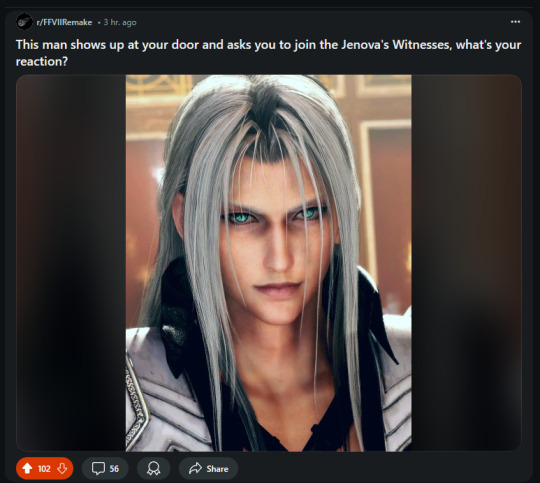
sometimes reddit has some good posts
49 notes
·
View notes
Note
Sephiroth loses mind connection to Jenova while fighting/monologueing/creeping after Cloud and goes still or completely changes tune to being himself before-Jenova. The unfortunate witness scared or amused (depends on who is that).
Sephiroth: Imagine, Cloud, as the dulcet tones of your loved ones' screams pierce through your remaining sanity, and how wretched it would be if you watched me kill—*cough cough cough cough*
Cloud:
Sephiroth: Oh! You have Angeal's sword. How have you been finding it? :) I'm sure he'd be pleased that it's fallen into such capable hands—*cough cough cough*
Cloud:
Sephiroth: Your futile attempts to protect those you hold dear will be in vain. Their safety is an illusion I will shatter—*cough cough cough*
Cloud:
Sephiroth: You remind me of Zack in that uniform. He was a good man, and I miss his presence dearly :(
Cloud:
Sephiroth: *cough cough cough* Are you frightened, Cloud?
Cloud: So fucking much.
123 notes
·
View notes
Text
You know what confuses me about Crisis Core.
So, we learn when Zack is dispatched with Tseng to Banora that Genesis murdered most of the townfolk, his own parents, a bunch of Shinra soldiers, and then started bombing the place with the arsenal he took. I mean, he fails because of Zack and then Shinra like. Sends an airstrike anyways to destroy evidence of company involvement, rendering that attempt moot. Then he like. Sends another summon after Zack.
In the course of the entirety of Genesis' rampage, it's implied that he killed probably a shit ton more people in cold blood and for his own ends, he turns a bunch of them into Genesis copies for crying out loud, which is quite horrific.
When Genesis is doing his rambling thing in front of the damn statue at the end of the game, Zack tells him he's here to help Genesis. And when he goes to contact the statue, Zack yells, "Don't let it take over, you're not a monster, you're one of us." Keep in mind Zack is aware of the atrocities Genesis committed of his own volition, even if he wasn't necessarily sound of mind because of the degeneration.
In contrast, during the Nibelheim incident, after Sephiroth locked himself inside the library for like a week without eating or sleeping, joined Jenova and then burned down the village, Zack finds him and demands answers. Sephiroth is clearly...not himself. His speech patterns are entirely different (creepy), he can't take his eyes off the containment unit, he ignores Zack's demands. Zack realizes Sephiroth isn't being himself, I recognize that, but it confuses me, that he didn't attempt to get through to Sephiroth harder, when he at least showed signs of doing so with Genesis and Angeal. Angeal I get, that was his mentor. Genesis though? Like even while Zack and Sephiroth were fighting, I expected at least some dialogue of Zack attempting to reason with him.
We know as players that Sephiroth goes on to do more heinous shit, but until then, his crimes are about the same as all those that Genesis committed. Genesis destroyed an entire village. Sephiroth destroyed an entire village. Genesis destroyed more than a village, so I'd argue the shit (outside of Shinra's orders of course) he did was worse.
Was it because Zack was too angry at the time? Nibelheim was still burning, Tifa was hurt, while the atrocities Genesis committed were distanced - Zack didn't see a majority of them. Maybe the whole "take over the planet" thing? Was it because Sephiroth was attacking him, and so Zack had to concentrate on surviving? Why was Genesis given grace, when Sephiroth wasn't? Yes, I understand Cloud and Tifa watched their parents get murdered in cold blood, so they're understandably furious, but what of all those families Genesis had destroyed? Even while Zack was at Shinra, he still intended to get Genesis back alive.
The entire theme of the game had been posing a question - are the SOLDIERS monsters. Zack had been adamant that they aren't at the beginning, while the three that were affected, Angeal, Sephiroth and Genesis hadn't been sure. Sephiroth was the only one who hadn't received any sort of contradiction to his own beliefs. Angeal did. Genesis did. And Zack fully WITNESSED the breakdown Sephiroth had in the reactor. I can't be certain if he witnessed the awful shit that Genesis had said to Seph, I know he was knocked down - but was he unconscious? Even if he didn't hear it all, he had to have heard the "no such luck, you are a monster." because Genesis said it BEFORE Zack was knocked over. Did he not see the pattern? I don't understand how it could be possible that he didn't see it.
And I get that Zack himself was starting to lose conviction on the idea that SOLDIERS aren't monsters, but if you knew what Angeal and Genesis had been feeling - their bitterness over being turned into monsters coinciding with Sephiroth's own breakdown and questioning of his humanity - then why did Zack let Sephiroth go through that mental breakdown on his own? Yeah, so he told him to leave him be - Zack thought Angeal had killed his own mother in cold blood and yet he still went after him. Zack said Sephiroth was like a man possessed, so he KNEW this was unusual behaviour too. Also, isn't it weird to just be stuck somewhere for seven days with no further orders? Did Zack try to get through to him repeatedly and fail? The game didn't show that to be the case, Sephiroth was alone the entire time he was reading in that library.
Or did he assume that the Silver General could've handled it on his own, once again holding Sephiroth to a different standard than everyone else?
I don't know, I just find it hypocritical. I know the Final Fantasy games are a series that only really shows you glimpses of the main villain, in an attempt to get a player to question what it means to be a hero - they did it well, the entire thing reaps of hypocrisy.
Shinra does what it wants, sends airstrikes to cover up their tracks, maintains the image it wants to via control of the news, holds a monopoly on everything, destroys a different lands for resources, and while Zack begins to question what he's doing because of Angeal and Genesis, the questioning has nothing to do with Shinra as an entity, only the soldiers within. Why didn't he question Shinra, for inflicting this onto Angeal, Genesis and Sephiroth? Why didn't he question that apparently Shinra has fucking cloning technology that can be used on the SOLDIERS? He picks up Angeal's blade while he was talking to Cloud, and is reminded of his SOLDIER honour. What honour? How did Angeal and Zack go for so long in Shinra while being "good people" without being disillusioned sooner by everything else they were doing? I understand the general population being fooled, but Angeal was one of the freaking firsts. They didn't question anything until Angeal and Genesis began to degrade? They weren't quite like Sephiroth, I'm assuming they weren't physically unable to leave if they wanted to be discharged. None of them were raised in a place where this was all they've ever known. None of them were raised to be disillusioned with death, to believe any empathy and compassion was weakness. Unlike Sephiroth, they had options.
And Sephiroth STILL had the mind to not only be compassionate with his own soldiers, but to want to defect. Because that was the only way he could've ever left Shinra.
I'm more convinced now then ever that Sephiroth was done dirty.
#Spoilers for Final Fantasy Crisis Core#Zack Fair#Sephiroth#Angeal Hewley#Genesis Rhapsodas#Final Fantasy 7#ff7#sephiroth crescent#Jenova#shinra company#sephiroth ff7
39 notes
·
View notes
Note
Does sephiroth ever get food cravings?
Occasionally, Sephiroth's predatory Jenova-influenced instincts kick in and he requires an extremely high protein intake. And will try to use his "Birthday Pass" (aka the scribbled piece of paper Angeal hands him every year because none of them know Sephiroth's ACTUAL birthday) to try to convince Angeal to take him to one of those Brazilian steakhouses. Angeal only agrees about half the time. More than half if Sephiroth whips out the Sad Kitty Eyes.
Be warned though. Sephiroth dining on copious degrees of meat is a truly terrifying experience. A dangerous yearly cataclysm that has ruined so many lives. Angeal and Genesis have seen things that no innocent mortal should ever have to bear witness to. The horror...
After Nibelheim, Sephiroth gets no cravings as he no longer requires food. He does occasionally wish to bite Cloud though. Maybe he's traded one protein for another 😈
#asks#ff7#ffvii#final fantasy 7#sephcanons#crisis core#genesis rhapsodos#angeal hewley#sephiroth#cloud strife#ags#final fantasy vii
35 notes
·
View notes
Text
This is what Sephiroth does on Sunday. It’s just facts now.
Remember when I typed “Jelly cell” instead of “Jenova cell”?? Well just now I typed Jenova again and my phone corrected it to “Jehovah’s Witness” I’m done
63 notes
·
View notes
Text
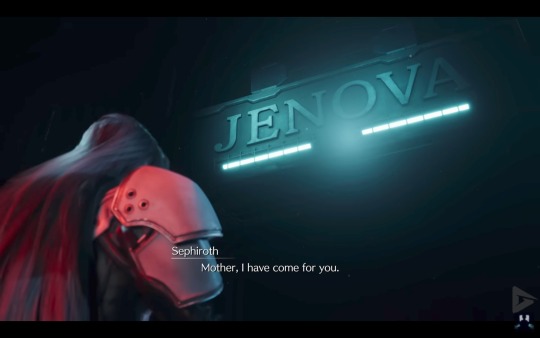
Here’s a particular detail to wonder about. How does Sephiroth gain access to the Jenova chamber when he arrives at the Mako reactor after pillaging Nibelheim?
We don't see him using any keycards or entering any passwords. There are no mechanical locks or keys to speak of. We don't see him tampering with any remote terminals in the mansion or the reactor itself. There is no indication that he is using voice commands either. He simply says "Mother, I have come for you. Now, open the way for me", and it magically opens after he's dealt with Tifa.
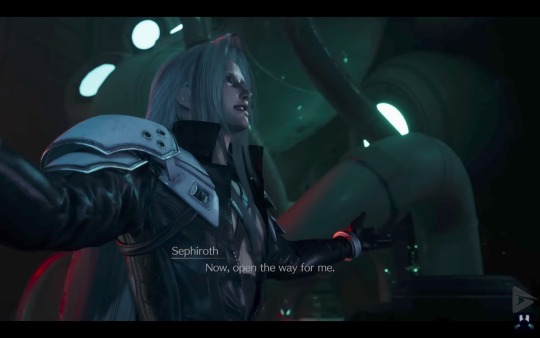
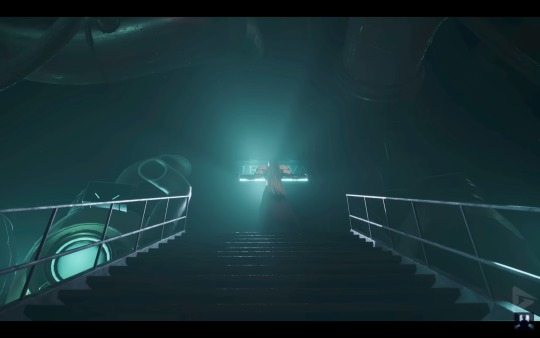
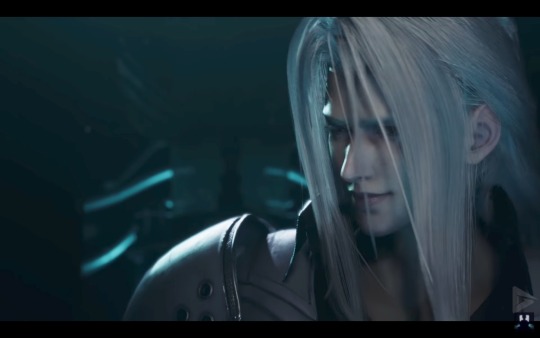
Interestingly, there is an odd device attached in front of the Jenova tube that resembles the entity and appears to be linked to some type of circuitry. When Sephiroth plucks it away, we see tubes and cables rupturing and leaking liquid.
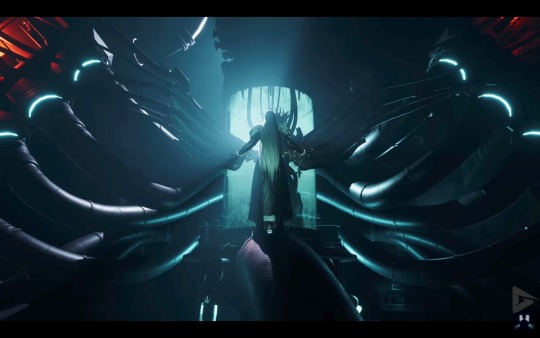
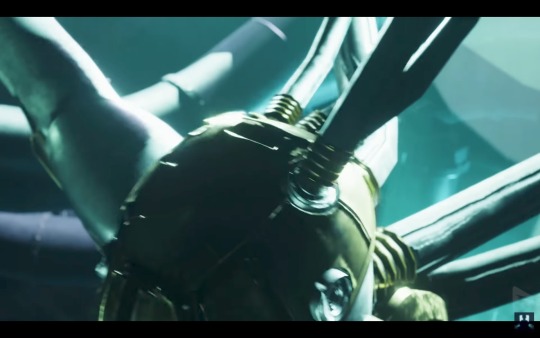
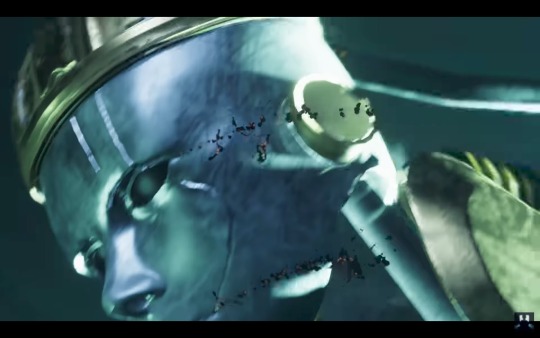
Based on the FFVII Remake, we know that Hojo had extensively experimented with Jenova cells, even imbuing machinery with them, as witnessed at the Drum. The evidence suggests that its organics can, in some cases, interact with various devices.
This raises the question whether Jenova's chamber was connected to the entire reactor complex, or at least the portion housing the test subject pods. If this is true, the phrase "Now, open the way for me" takes on a far more sinister meaning. Even more disturbingly, it raises yet another troubling possibility. Who's to say that if Jenova could tamper with the sealed door, it couldn't also tamper with the pod system? In other words, what if the creature was responsible for the entire alleged "reactor malfunction"?.. [some additional speculation on Jenova being “awake”]
Another potential conspiracy theory emerged immediately after the original game was released. What if Hojo orchestrated the Nibelheim mission? While there is no solid evidence that Hojo or his assistants recently visited the site (the townspeople would have likely noticed the visit or the helicopters heading towards reactor H-pad), Sephiroth goes out of his way to emphasize that the Nibelheim reactor is unique in that it is under Research & Development jurisdiction rather than Urban Development dept.
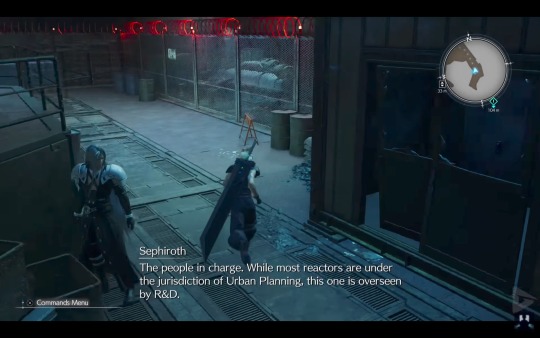
R&D most likely had a remote monitoring/control system for the chamber environment. Hojo, in particular, has expressed an interest in Palmer's testimony that Sephiroth was seen walking the halls of ShinRA headquarters, famously stating that he would like to see Sephiroth and Aerith produce an offspring.
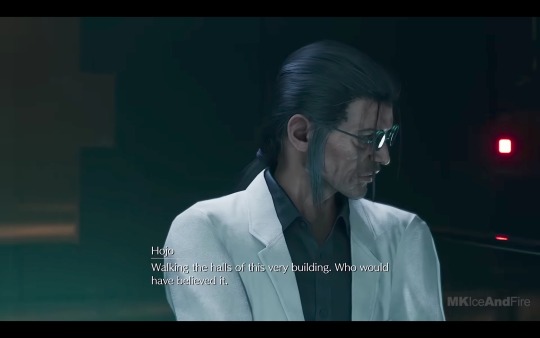
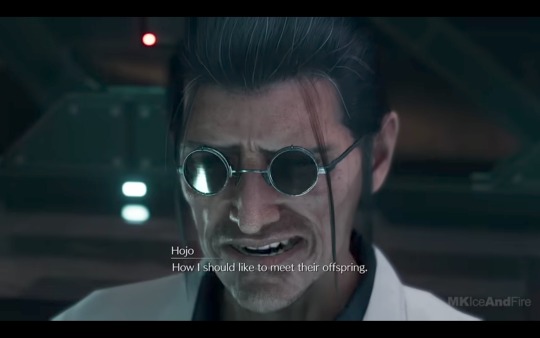
Later in OG, Hojo was shown to be fascinated by his pet theory of Reunion being played out. As a result, it's not unreasonable to speculate that Hojo may have specifically arranged for Sephiroth to be dispatched to Nibelheim to observe Jenova specimens come into contact and its corollary. If there were security cameras in the Jenova chamber, Hojo might have been able to remotely unlock the door [upon seeing Sephiroth approach].
It is indeed a terrifying possibility that Hojo could be directly responsible for the Nibelheim tragedy. Before Crisis Core and Genesis, In OG, prior to Genesis stuff being introduced, it seemed suspicious to send two top SOLDIER members to a remote and dilapidated reactor to investigate reported monster sightings.
@pen-and-umbra
#sephiroth#jenova#hojo#ffvii#ff7#final fantasy vii#ffvii rebirth#ffvii remake#ff7 rebirth#ff7 remake#ffvii@luv fandoms
53 notes
·
View notes
Text

I decided to take some time out today and actually use the Leviathan method to get to work on Blood and Stardust. Bia's time in Final Fantasy 7 will be comprise of 3 fan fictions. I think it will allow for a more cohesive story to follow if it is broken up like this.
Blood and Stardust will be tagged: #wip: blood and stardust. It will be, at least, between 50 - 60k words. i am also going to set aside some time to officially work on a timeline, since writing without an outline was kind of causing me anxiety. 😂

Announcing Blood & Stardust.
Scope: Blood & Stardust follows Bianca, a celestial-demonic hybrid, as she emerges from a multiversal abyss and is drawn into the web of Shinra’s secret underground operations. The story focuses on her intense and brief bond with Sephiroth, which sparks an emotional and existential journey through her torn nature and deepening connection with him. As she grapples with her growing love for Sephiroth and the darkness that threatens to consume her, Bianca faces pivotal choices—ranging from witnessing Sephiroth’s descent into madness during the Nibelheim Incident to her own internal struggles. The multiverse serves as a vast yet intimate backdrop, emphasizing the personal turmoil Bianca experiences as she wrestles with her identity and her ultimate loyalty to Sephiroth, culminating in her abduction by Hojo, his men, and Shinra after the devastating event at Mt. Nibel. Through themes of identity, destiny, love, and darkness, the story explores Bianca’s emotional evolution and the forces shaping her path.

Conflict: The central conflict revolves around Bianca’s internal struggle as she grapples with her celestial and demonic nature, as well as her growing attachment to Sephiroth. She must balance her desire for connection with the fear of losing herself to the darkness that both she and Sephiroth embody. The battle between her two natures—angelic and demonic—intensifies as she forms an emotional bond with Sephiroth and watches his descent into madness.
A side conflict is the dark influence of Jenova, an ancient, malevolent entity manipulating events from the shadows. Jenova’s corruption seeps into the minds and souls of those around it, acting as an insidious force that fuels chaos and destruction. For Bianca, this influence tests her celestial and demonic duality, triggering her purification abilities as she fights against the encroaching darkness instinctively. This conflict represents a battle not just against an external force but against corruption’s seductive power, threatening to consume her identity and her tenuous grasp on light and hope.
The story takes place during the events of Final Fantasy VII, which occurs in the late 20th century, in a world that blends advanced technology with deep ecological and supernatural threats. The setting is grounded in a contemporary world with high-tech industries like Shinra, and scientific experimentation on a vast scale, all while planetary forces like the Lifestream and Jenova’s influence loom large.
The story unfolds over the course of seven days during the Final Fantasy VII timeline, specifically in the period leading up to the Nibelheim Incident. This brief yet intense time frame explores Bianca's arrival at the Shinra Mansion, her emotional and physical bond with Sephiroth, and the complexities of her connection to him. It culminates in the chaos of Sephiroth's descent into madness, the destruction of Nibelheim, and Bianca’s eventual capture by Shinra for experimentation, setting the stage for her role in the larger conflict to come.
The conflict manifests in both subtle internal struggles and blatant external actions. Bianca’s battle with her dual nature is more internal and subtle now, often expressed through her fear of losing control, her immense grief at losing her first husband, and her evolving feelings for Sephiroth. On the other hand, the external conflict becomes more pronounced through events like the Nibelheim Incident, where Sephiroth’s madness causes destruction, and Bianca must act to help those around her, only to be exploited by the very humanity she tried to save during the Incident. The external manifestation of Bianca’s internal conflict is also seen when she attempts to intervene in Sephiroth’s downfall, resulting in her eventual capture.
Where does it take place?
Shinra Mansion Library: A hidden underground library beneath the Shinra Mansion, filled with forbidden knowledge, experimentation notes, and mysteries about the connection between Bianca and Sephiroth. It’s here that Bianca first encounters Sephiroth and begins her emotional journey.
Nibelheim: A secluded town with a dark past, where the final, climactic events of the first book occur. The Nibelheim Incident sees Sephiroth lose his sanity, causing a destructive chain of events, including the burning of the town and the catastrophic aftermath at Mt. Nibel. Bianca’s emotional turmoil intensifies here as she confronts Sephiroth’s madness head-on.
Ethereal Nexus: A liminal space between dimensions, where Bianca briefly drifts through before arriving in the Shinra Mansion. This space represents her disconnection from her past life and her chaotic journey through multiple realities.
Summary: Bianca’s conflict is rooted in her origins and the traumatic events that have shaped her life. Born from the assault of a celestial archangel by a a demon, she is caught between two worlds, neither of which fully accepts her. The multiverse is a reflection of her inner turmoil, constantly pushing her between worlds and forcing her to confront her own identity. When she arrives at the Shinra Mnaor, she unknowingly ties her fate to Sephiroth, a man who is also struggling with the truth of his origins. Their connection is deepened by shared trauma, which draws them together in a bond that both heals and destroys them. Bianca’s internal battle becomes more urgent as she navigates her growing feelings for Sephiroth, the fear of becoming consumed by his darkness, and the powerful lure of Jenova’s influence. This collision of destinies, combined with the manipulations of Shinra and Hojo, sets in motion a chain of events that will lead to the Nibelheim Incident, a pivotal moment that will force Bianca to choose between love and her own survival.

tagging some fellow mutuals: @themaradwrites @littleshopofchaos @serenofroses @megandaisy9 @watermeezer
@nightingaleflow @prehistoric-creatures @creativechaosqueen @chickensarentcheap @glbettwrites
@seastarblue
#oc: bianca moore - ff#character: sephiroth#sephiroth#writeblr fanfiction#final fantasy 7 fanfic#final fantasy fanfiction#canon x oc#sephiroth x oc#otp: bianca / sephiroth#writing accountability#wa: fwc: ff#fantasy worlds collide#Flash Fiction: FWC - FF#AU: canon divergent#wip: blood and stardust#fire
11 notes
·
View notes
Text
Alright I know I'm the insane local Jenova's Witness but here me out:
Spoilers for Rebirth and The First Soldier
The purple magic and the single black cloak (cloak is tattered like Remake's are) really make me think this haunted forest or wherever they're going next in First Soldier has some connection to Jenova.



Those you hate. Those you fear. Those you love.
And maybe all the headaches/glitching are deeper than we think. Maybe we weren't completely right. Since we know for a FACT Glenn was written for Rebirth before the mobile game, First Soldier might only be a part of the Remake/Sequel to FF7.
Those headaches and the edge of creation might literally be results of the Jenova/Original Sephiroth trying to gain control (Like how in Rebirth, the Sephiroth Reborn fight canonical takes place in multiple timelines/"worlds" at once).
I'm very excited for the next update. I can't wait to find out.
#ff7ec#ff7 ever crisis#ff7 rebirth spoilers#ffvii#final fantasy vii#ff7#sephiroth#final fantasy 7#jenova#hojo
41 notes
·
View notes
Text

Alright, look. Imma level with you. Ultima is an extradimensional being who came to Eorzea trying manipulate man and destroy itself and feed upon the excess of aether on the planet similar to JENOVA feeding on the various worlds lifestreams. Venat's meeting with Rhalgr happened while she was still an Azem and he helped destroy an oncoming meteor that was going to strike ancient Eitheirys. In addition to this, one of the first things Meteion reports on initially is finding some worlds just completely vacant of all life only one having even the bones of its residence as any indication that something had lived there before. Since she did not witness their deaths like the Dead Ends, she doesn't know what killed them. Which puts a sort of question mark on how they met their ends. And I repeat from my Emet-Selch son post, nothing ever EVER dies simply in this game. To finish off since this happens before Venat steps down from the seat of the Traveler, this meteor also possibly leaves behind a fragment in the Heart of Sabik which Athena discovers and goes mad over. Meanwhile, now that the threat is over Rhaglr and Venat move on while Ultima digs in to build her nest or is vanquished but later resummoned to eventually faced off against by the nation of Ivalice and its heroes and she is power great enough that the only way the Warrior of Light survives the encounter is from the aid of ghosts of the past. Its all fucking connected.

75 notes
·
View notes
Text
I'd say pick a deity-like figure from the universe and replace it with that, Final Fantasy's got tons
i keep wanting to have bobby say/think 'jesus fuck' but need to remind myself every time that i cant, at least in fate. they dont have that guy. he doesnt exist
#only one i can think of off the top of my head is uh.. Sephiroth's mom. Jenovah?#call that a Jenova's Witness
5 notes
·
View notes